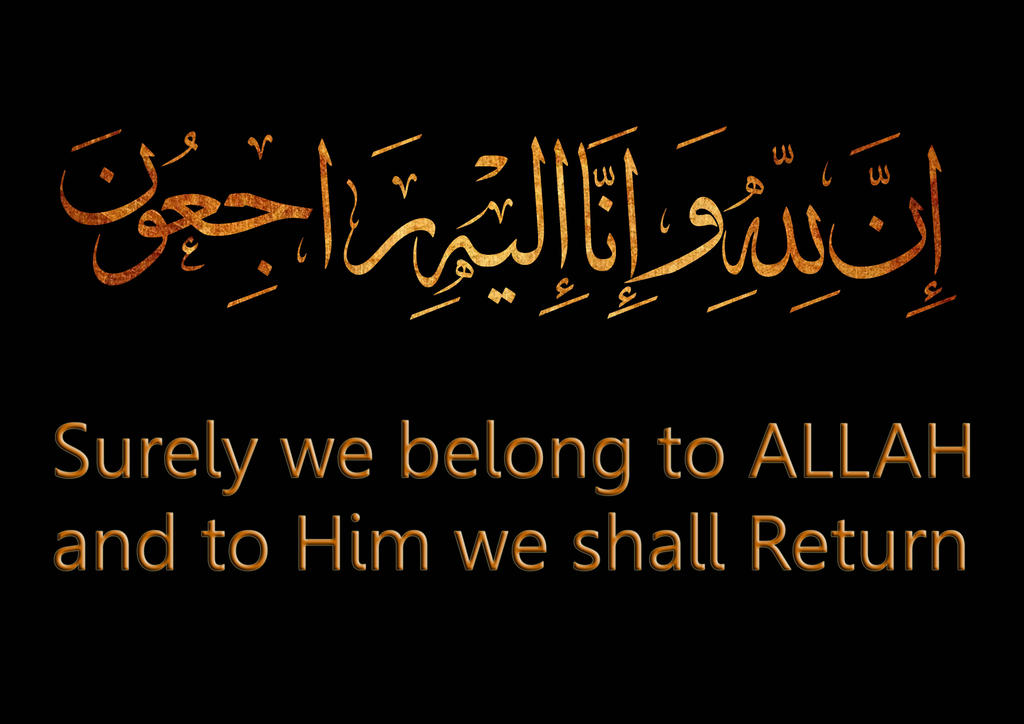
Ina Lilah Wa Ina Ilayhi Rajioun En Arabe AUTOMASITES
Inna lillahi wa inna ilayhi raji'un (إِنَّا لِلّهِ وَإِنَّـا إِلَيْهِ رَاجِعونَ) is a verse of the Quran which means Surely we belong to Allah and to Him shall we return. This phrase is recited by Muslims when a person is struck by calamity in life, and is also recited upon hearing the death news of a Muslim.

Inna Lillahi Wa Inna Ilaihi Rajioon Quran Islamic Messages Arabic Riset
In Arabic you say إِنَّا لِلَّٰهِ وَإِنَّا إِلَيْهِ رَاجِعُون which is pronounced as "Ina Lilah Waina Allah Rajiun", while in English it is said as "We surely belong to Allah and to Him we shall return". Now let's understand its English meaning, when to say it and how to respond to it. What is the meaning of Innalillahiwainnailaihirojiun?
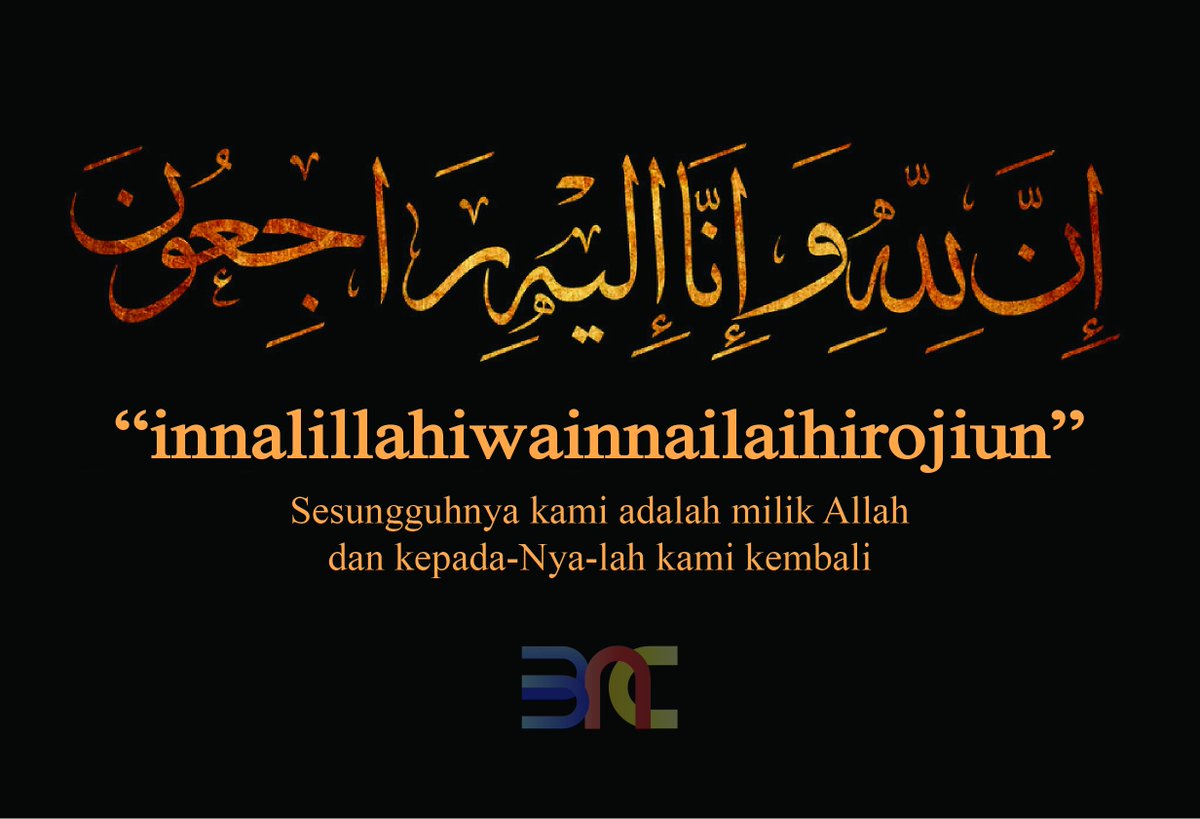
Tulisan Arab Innalillahiwainnailaihirojiun Yang Benar Beserta Makna Gambaran
Inna lillahi wa inna ilayhi raji'un also known as Istirja is a powerful dua that Muslims recite mainly when they hear someone has passed away and in times of hardship generally. It gives them strength, clarity, and patience, as well as keeps those who say it concentrated on what's truly important. Table of Contents Pronunciation

Inna Lillahi Wa Ilaihi Rajiun Arabic Calligraphy Transparent Background PNG पाठ प्रभाव AI मुफ्त
The translation of this phrase inna lillahi wa inna ilayhi raji'un is "Indeed, to Allah we belong and to Allah we shall return." The origin of this dua or saying comes from the Quran, Surah Baqarah ayah 156: Inna - meaning Indeed, truly, surely or 'verily, we'. Li-llahi - We belong to Allah.

Arabic Calligraphy Of Inna Lillahi Wa Inna Ilaihi Rajiun Traditional IMAGESEE
InstanceBeginEditable name="TheBody" -->
"INNALILAHI WA INNA ILAYHI RAJIOON"
Allah says: "Innalilahi wa inna ilayhi rajioon" To Allah we belong and to Him we shall return."

Innalillahi PNG Image, Innalillahi Wa Inna Ilaihi Rajiun Arabic Handwriting, Innalillahi
Inna lillahi wa inna ilayhi raji'un ( Arabic: إِنَّا ِلِلَّٰهِ وَإِنَّا إِلَيْهِ رَاجِعُونَ, ʾinnā li-llāhi wa-ʾinnā ʾilayhi rājiʿūna ), also known as Istirja (Arabic: ٱسْتِرْجَاع, ʾIstirjāʿ ), is an Arabic phrase, mentioned in the second surah of the Quran, [1] and meaning "Indeed, we belong to Allah, and indeed, to Him we return."

Innalillahi Wa Inna Ilayhi Rajiun Kaligrafi Arab Latar Belakang Transparan, Bahasa Arab
Ilayhi is Arabic for 'towards Him.' Rajioon: translates as 'Return.' English Translation of inna lillahi wa inna ilayhi.

Inna Lillahi Wa Ilayhi Rajiun Em Caligrafia árabe PNG , Innalillah árabe, Innalillahi Wa Inna
Asalamu Alaikum, Inna lillahi wa inna ilayhi raji'un إِنَّا لِلَّٰهِ وَإِنَّا إِلَيْهِ رَاجِعُونَ. To God we belong and to Him we return. It is with great sadness that we have learned of the passing of our dearly beloved community member and brother, Marwan R. Mahairi. The Mecca Center offers prayers.

Inna Lillahi Wa Inna ilayhi Raji'un in Arabic Meaning in English
istirja/ "inna lillahi wa inna ilayhi raji'un" meaning. Inna lillahi wa Inna ilayhi raji'un means : " Surely to Allah we belong and to Him we will all return. ". Inna: Meaning Truly, Indeed, surely, verily 'we'. Lillahi: We belong to Allah. Wa Inna: Wa means 'and'; Inna means 'indeed.
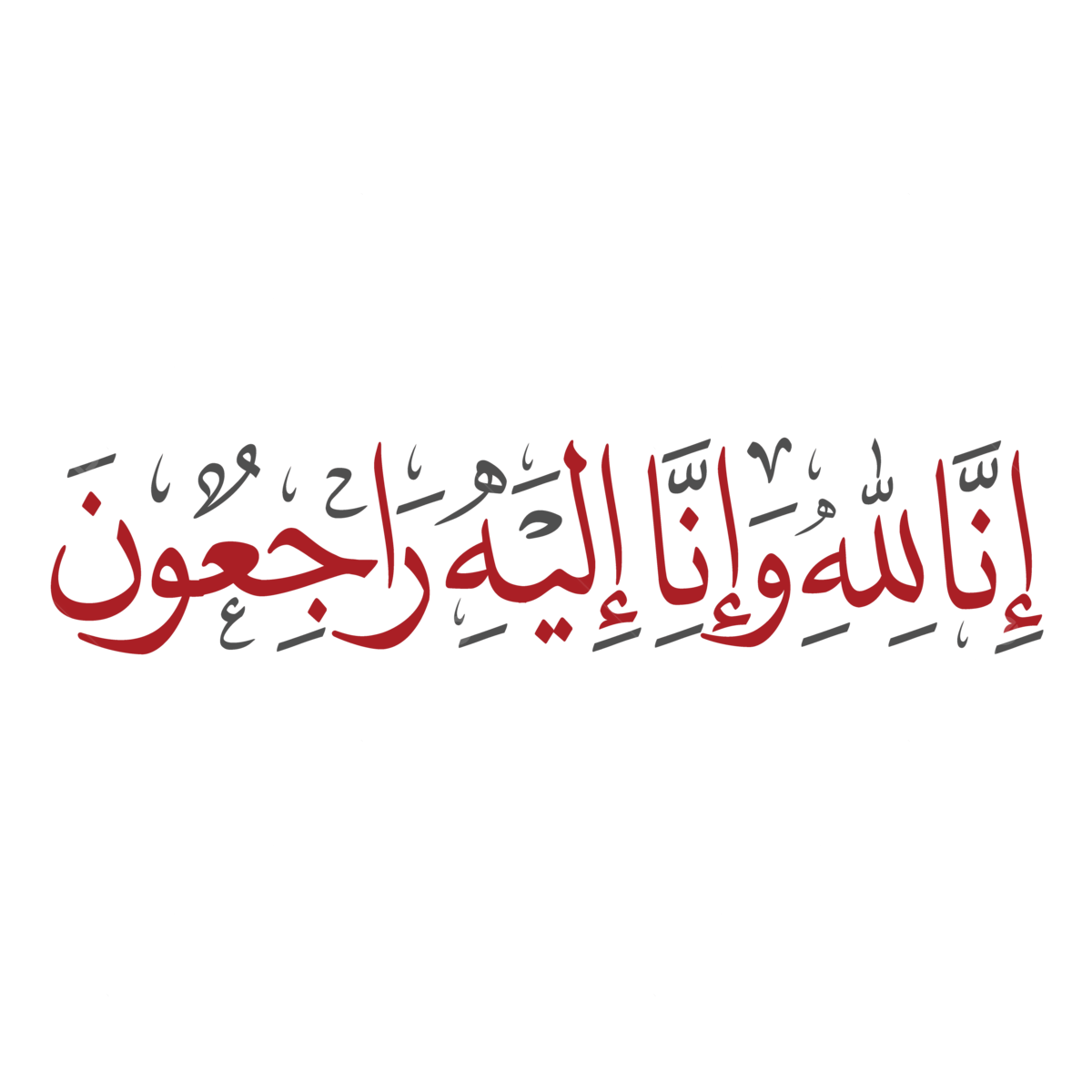
Inna Lillahi Wa Ilaihi Rajiun In Arabic Calligraphy Handwritten On Transparent Background
Inna Lillahi Wa Inna Ilayhi Rajioon Inna lillahi Wa Inna ilayhi raji'un (Arabic: إِنَّا لِلَّٰهِ وَإِنَّا إِلَيْهِ رَاجِعُونَ, ʾinnā li-llāhi wa-ʾinna ʾilayhi rājiʿūn a), also known as Istirja (Arabic: ٱسْتِرْجَاع, ʾIstirjāʿ), is narrated that the light of Prophet Mohammed (PBUH) one night shut off, at that moment, Prophet.
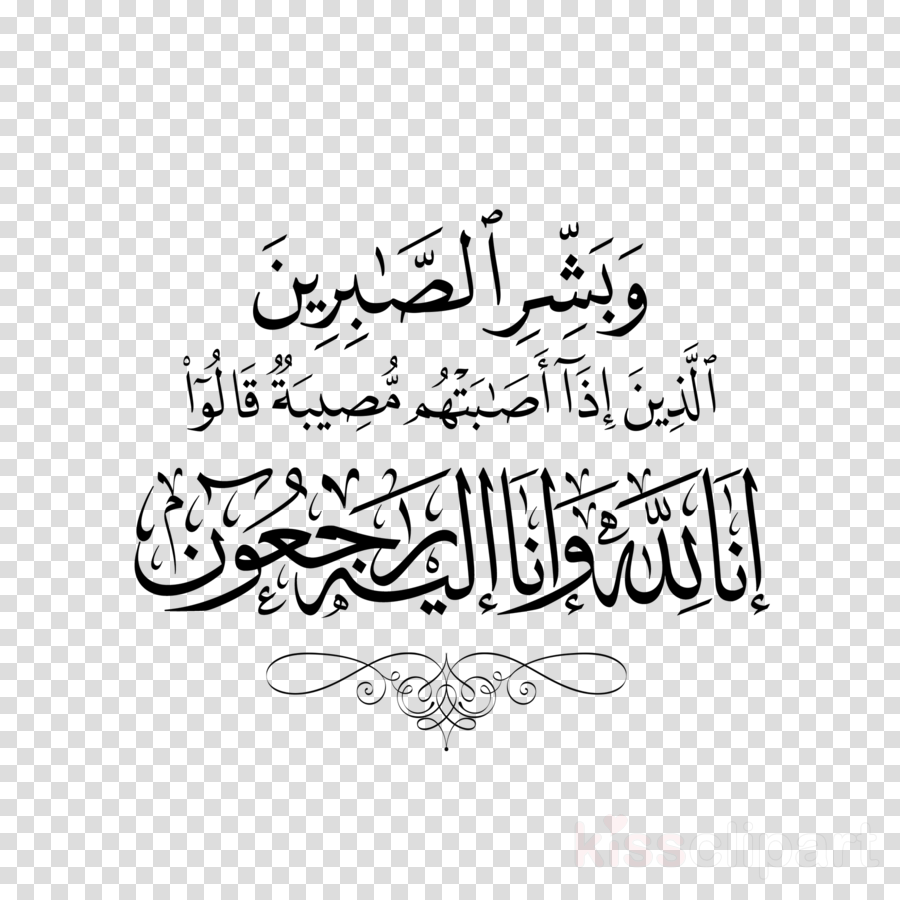
Kaligrafi Innalillahiwainnailaihirojiun Png Free PNG Image
( إنَّا لِلَّهِ وَإِنَّا إِلَيْهِ رَاجِعُونَ): We usually say Inna lillahi wa Inna ilayhi raji'un at the death of a person. Do you know that we can say Inna lillahi wa Inna ilayhi raji'un at any hardship? Nabi sallalahu alaihe wa sallam used to say this whenever he suffered any hardship. What does Inna lillahi wa ilayhi raji'un mean? Contents hide
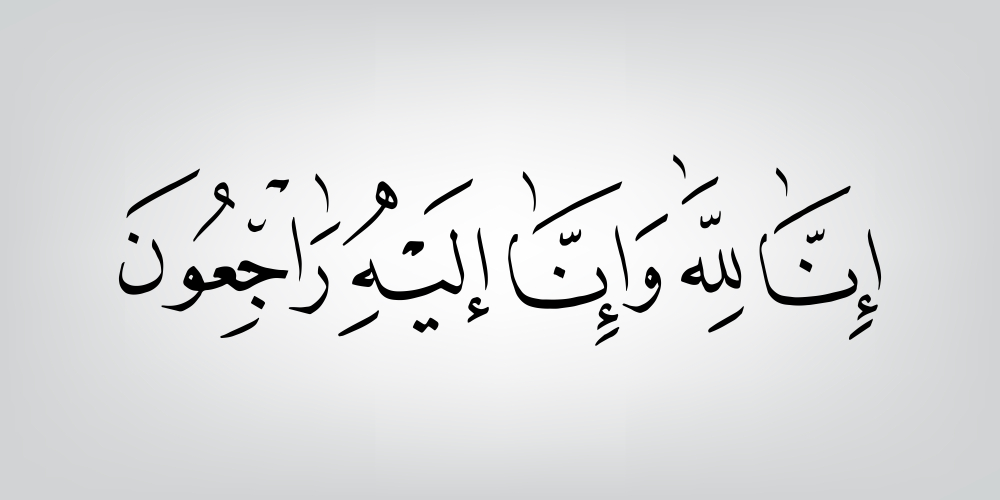
Buy Inna Lillahi wa inna ilaihi raji'un islamic poster Sticker Paper Poster, 12x18 Inch
Inna lillahiwa Inna ilayhi raji'un as Condolence at death of a Muslim: It is mustahab (alluring) to mourn with the group of the dead in words like these; "May Allah pardon and show kindness toward the dead!

Inna Lillahi Wa Ilaihi Rajiun Calligrafia Araba Scritta A Mano Su Sfondo Trasparente, Innalillah
Inna lillahi wa inna ilayhi raji'un ( Arabic: إِنَّا ِلِلَّٰهِ وَإِنَّا إِلَيْهِ رَاجِعُونَ, ʾinnā li-llāhi wa-ʾinnā ʾilayhi rājiʿūna ), also known as Istirja ( Arabic: ٱسْتِرْجَاع, ʾIstirjāʿ ), is an Arabic phrase, mentioned in the second surah of the Quran, and meaning "Indeed, we belong to Allah, and indeed, to Him we return."
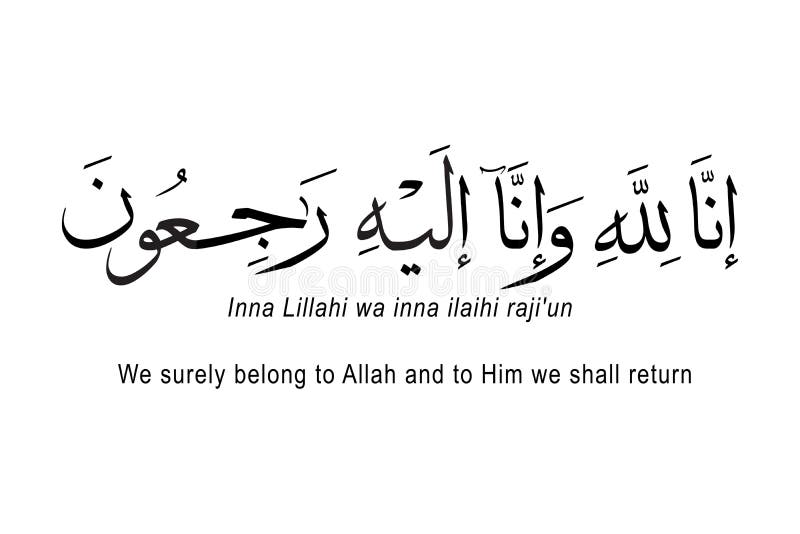
Arabic Calligraphy Artwork of Inna Lillahi Wa Inna Ilaihi Raji`un. Translations we Surely
For every affliction, one should say: 'Inna lillahi wa inna ilaihi rajiun - We belong to Allah and to Him we shall return.'. For the affliction of death, one should add: ' Allahumma Ajjurni fi musibati wakhluf li khairan minha, meaning O Allah compensate me in my affliction, recompense my loss and give me something better in exchange.

The DuaInna Lillahi Wa Inallah e Raji Oon English and Urdu Translation
Inna lillahi wa inna ilayhi raji'un, commonly known as Istirja (Arabic: Istirj), is a command from the Quran for Muslims. It is given in the second surah of the Quran and means, "Surely, we belong to Allah, and surely to Him do we return.". Muslims frequently say this verse as a gesture of patience and a recognition that God is the Almighty and will not subject them to greater hardship.
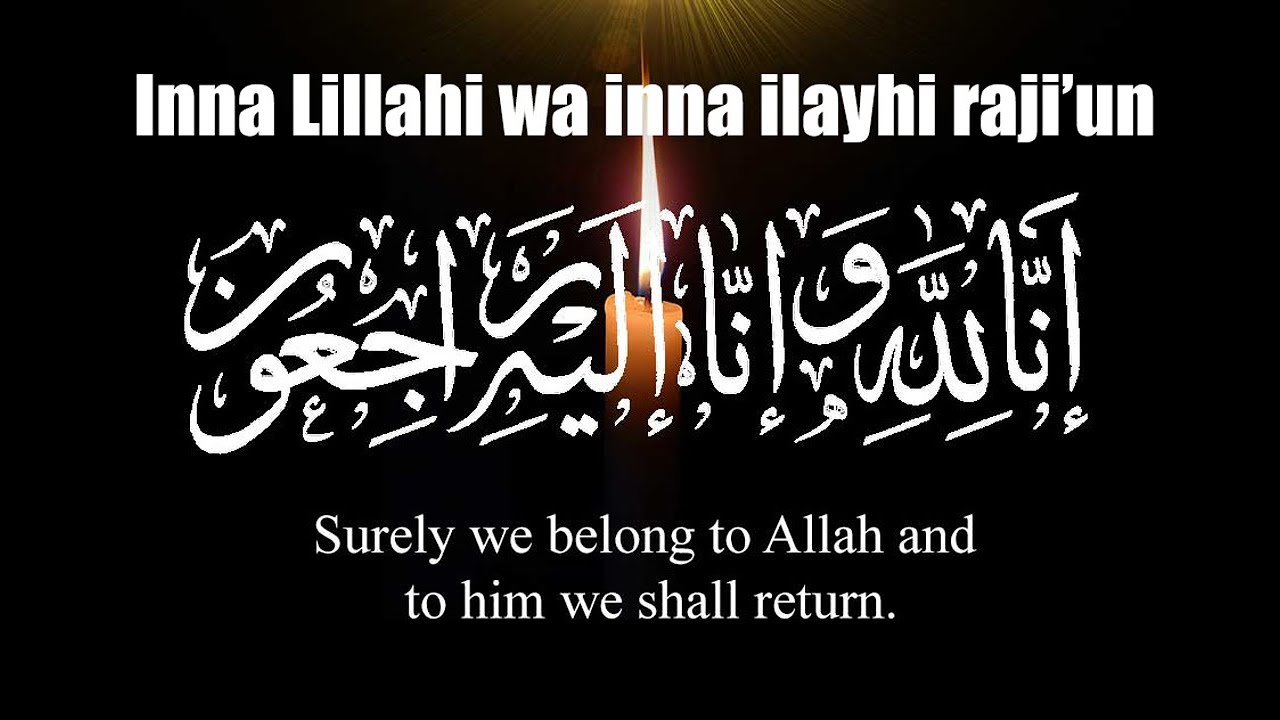
Inna Lillahi wa inna ilayhi rajihun The Sierra Leone Telegraph
Inna lillahi wa inna ilayhi rajiun is a dua often said for condolences or when calamity strikes. And it's taken from a verse in Quran in surah al Baqarah. Allah (SWT) said in the Holy Quran: And We will surely test you with something of fear and hunger and a loss of wealth and lives and fruits, and We'll reward the patients.